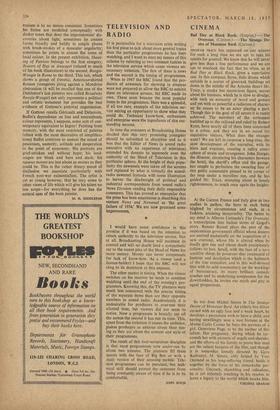Bad Day at Black Rock. (Empire.)—The Overcoat. (Curzon.)— —The Strange
De- sire of Monsieur Bard. (Curzon.) SPENCER iritscy has appeared on our screens for such a long time we are apt to take his talents for granted. We know that he will never give less than a fine performance and we are apt to overlook the fact that he often, as in Bad Day at Black Rock, gives a superlative one. In this compact, fierce, little drama which unfolds in a scatter of gimcrack buildings set down in the middle of the Arizona desert Mr. Tracy, a stocky but mysterious figure, moves about his business, which he is slow to divulge, with such an economy of word and gesture and yet with so powerful a radiation of charac- ter he ceases to be an actor playing a part. Though this is the goal of all actors it is rarely achieved. The members of the settlement huddled up to the railroad and ruled by Robert Ryan, have nearly all of them been concerned in a crime, and they are in no mood for inquisitive visitors. What does the stranger want? We are left in suspense a long time, the slow development of the narrative, with its hints and evasions, creating a sultry atmo- sphere of strain and strangeness. John Sturges, the director, circulating his characters between the hotel, the sheriff's office and the garage. has caught to perfection the sweating fear of this guilty community pinned in its corner of the map under a merciless sun, and he has guided Mr. Tracy, stumping about in lonely righteousness, to touch once again the heights.
At the Curzon France and Italy give us two studies in pathos, the hero in each being blighted by circumstance and each, in . a fashion, attaining immortality. The better to my mind is Alberto Lattuada's The Overcoat, a transcription into Italian terms of Gogol's story. Renato Rascel plays the part of the impecunious government official whose dreams are centred exclusively on the acquisition of a new overcoat, whose life is altered when he finally gets one and whose death precipitately follows its loss. Small, with the face of a very sensitive sheep, he possesses that compound of humour and desolation which is the hallmark of the true comedian, and in this well-devised film with its acid commentary on the workings of bureaucracy, its many brilliant comedy touches and its underlying compassion for the downtrodden, he invites our mirth and pity in equal proportions.
So too does Michel Simon in The Strange Desire of Monsieur Bard. An elderly bus driver cursed with an ugly face and a weak heart, he develops a passionate wish to have a child, and having unwillingly won a vast fortune at the . Monte Carlo Casino he buys the services of a girl, Genevieve Page, to be the mother of this infant. Her pregnancy, during which he sur- rounds her with pictures of angels and cherubs. and the efforts of his family to prove him mad are the salient features of the film, and though it is somewhat loosely directed by Gera Radvanyi, M. Simon, ably helped by Yves Deniand as his long-suffering friend, holds it together by the force of his remarkable per- sonality. Uncouth, shambling and ridiculous. he is yet infinitely touching in his resolve to leave a legacy to the world which mocks hitt). VIRGINIA GRAHAM










































 Previous page
Previous page